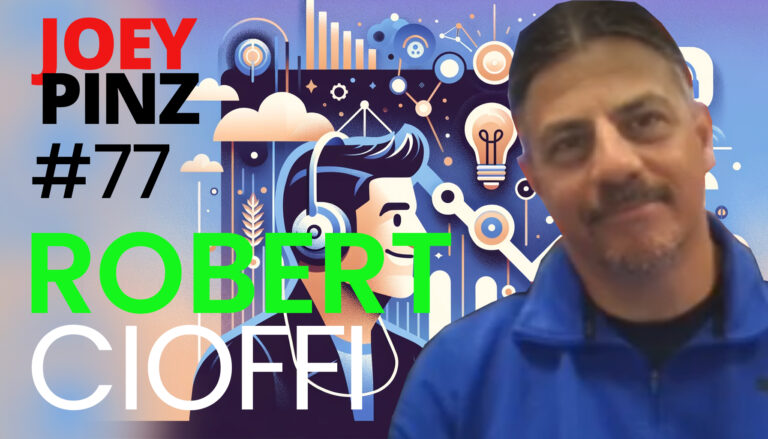In a enlightening conversation with Robert Cioffi, a veteran in the Managed Service Providers (MSPs) field, we dove into a myriad of topics that resonate with many in the IT and MSP landscape. Robert, with decades of experience and a keen insight into both the technical and business aspects of MSPs, shared valuable lessons and observations that can immensely benefit MSPs looking to elevate their services and business operations. Here are five key insights from our conversation with Robert Cioffi that can help MSPs reach new heights.
1. The Importance of Peer Groups and Community Engagement
One of the most emphatic points Robert made was about the significance of being part of MSP peer groups and actively engaging in the community. The MSP industry is unique in its willingness to share knowledge, strategies, and insights among competitors, which can be a goldmine for any MSP looking to improve. Robert stressed that no MSP has all the answers, and being part of a peer group can expose you to new ideas, strategies, and solutions to common problems. It’s a platform for learning, sharing, and growing together, where even a perceived “newbie” can offer valuable insights.
2. The Overtooling Dilemma
A critical observation shared by Robert is the tendency for MSPs to overtool – subscribing to numerous tools and services, each adding to the monthly overhead, without fully utilizing them. This habit leads to increased costs and complexity without corresponding value. The advice is to critically assess each tool for its actual utility and to ensure that your team is extracting the maximum value from it. Sometimes, less is more if it means that your team can focus on leveraging the full capabilities of fewer, more impactful tools.
3. Vendor Relationships and Partner Tax
Robert pointed out the evolving nature of the relationship between MSPs and their vendors. The concept of “partner tax,” where the costs of maintaining vendor relationships and attending trade shows are seen as burdensome, was discussed. However, Robert suggested a mindset shift towards viewing these costs as investments in deepening relationships with vendors and staying abreast of the latest developments and features that could benefit clients. Engaging with vendors not just for new sales but for enriching existing relationships is crucial.
4. Billing Practices that Reflect MSP Business Models
The conversation touched upon an essential operational aspect – billing. Robert highlighted a case where a vendor changed its billing model to match the MSPs’ per-user, per-month model, leading to widespread adoption. This example underscores the need for MSPs to adopt billing practices that align with their business models and client expectations, enhancing operational efficiency and customer satisfaction.
5. The Continuous Journey of Learning and Adaptation
Lastly, Robert inspired with his personal philosophy on continuous learning and pushing boundaries. The IT and MSP landscapes are perpetually evolving, with new challenges and opportunities emerging regularly. Staying static is not an option. MSPs must foster a culture of learning, experimentation, and adaptation, both within their teams and in their service offerings.
Conclusion
Our conversation with Robert Cioffi offered numerous insights, but one overarching theme was clear: success in the MSP industry requires a blend of technical excellence, strategic business operations, and a deep commitment to continuous improvement. By embracing community engagement, rationalizing tool usage, nurturing vendor relationships, adopting smart billing practices, and fostering a culture of ongoing learning, MSPs can set themselves up for sustained success and growth.
5 Key Insights from My Conversation with Robert Cioffi That Can Elevate MSPs
In an enlightening podcast episode, I had the privilege of conversing with Robert Cioffi, a seasoned professional in the MSP (Managed Service Provider) arena. With years of experience under his belt, Robert shared invaluable insights that can significantly elevate MSP businesses. Here are five crucial takeaways from our conversation that MSPs should consider implementing to enhance their operations and service delivery.
1. Embrace Community and Peer Groups for Continuous Learning
Robert emphasized the importance of engaging with peer groups and the wider MSP community. This collaboration fosters a learning environment where MSPs can share experiences, challenges, and solutions. Engaging in these communities allows for the exchange of ideas that can lead to innovative approaches in tackling common industry challenges. Peer groups serve as a vital resource for MSPs to benchmark their operations, understand industry standards, and continuously improve their service offerings.
2. Evaluate and Streamline Your Tool Stack
A common predicament for MSPs is the tendency to become over-tooled—subscribing to more software solutions than are effectively utilized. Robert highlighted the necessity of regularly assessing the tool stack to ensure that each tool is providing maximum value and that MSPs are not paying for redundant functionalities. Optimizing the tool stack not only reduces operational costs but also enhances efficiency by ensuring teams are not overwhelmed by an excessive number of tools.
3. Forge Strong Partnerships with Vendors
The relationship between MSPs and vendors is pivotal. Robert discussed the need for a paradigm shift in how MSPs interact with vendors, advocating for deeper engagement beyond the initial sale. Vendors should be seen as partners in the MSP’s mission to deliver superior services. Regular communication with vendors can uncover new features and functionalities that MSPs can leverage to enhance their service offerings. Additionally, by re-evaluating the partnership and billing models, MSPs can align vendor services more closely with their business operations and customer billing cycles.
4. Focus on Value Over Features
In discussions with clients, Robert advises MSPs to focus on the value their services provide rather than listing features. This approach shifts the conversation from a technical to a business perspective, highlighting how MSP services solve specific business problems and contribute to the client’s success. By articulating the value and impact of their services, MSPs can foster stronger relationships with their clients and position themselves as indispensable partners in their client’s business operations.
5. Continuous Self-Improvement and Providing Value
At the heart of Robert’s philosophy is the drive for continuous self-improvement and the desire to provide value to others. This mindset extends beyond personal development to the operational ethos of an MSP. By continually seeking ways to enhance their services, operations, and client engagements, MSPs can not only achieve their own potential but also significantly contribute to the success of their clients’ businesses.
Our conversation with Robert Cioffi unveiled critical insights that can help MSPs navigate the complexities of the industry. By fostering a culture of continuous learning, streamlining operational tools, building meaningful vendor partnerships, focusing on delivering value, and committing to self-improvement, MSPs can elevate their services and achieve greater success. These practices are not just strategies for business growth; they are foundational principles that can guide MSPs in becoming more effective, responsive, and valued partners to their clients.
LinkedIn: (49) Robert Cioffi | LinkedIn


